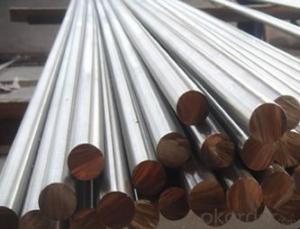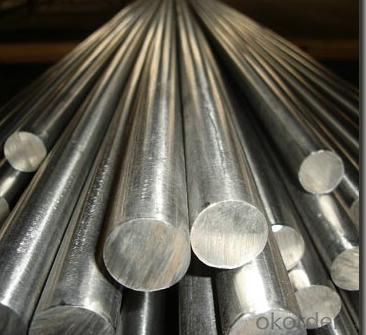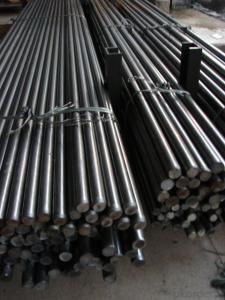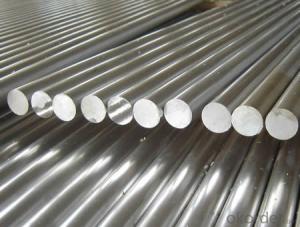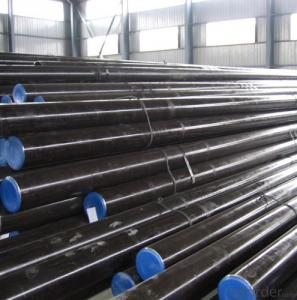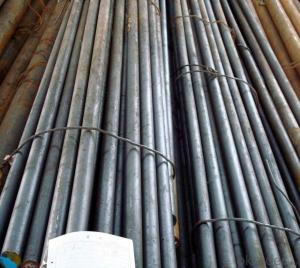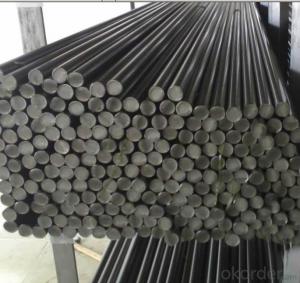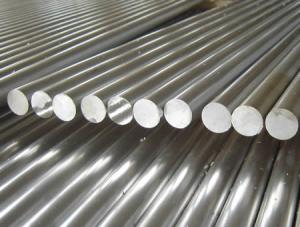High Quality Spring Steel Round Bar 40-50mm
- Loading Port:
- China main port
- Payment Terms:
- TT or LC
- Min Order Qty:
- 100 m.t
- Supply Capability:
- 10000 m.t/month
OKorder Service Pledge
OKorder Financial Service
You Might Also Like
High Quality Spring Steel Round Bar 40-50mm
Product Description:
Spring Steel can be divided into two types. One is carbon spring steel, and other one is alloy spring steel.
Alloy spring steel is based on carbon spring steel, by adding one or more alloying elements to improve the mechanical properties, hardenability and other properties to meet the requirement for manufacture all kinds of spring steel.
Specification of High Quality Spring Steel Round Bar 40-50mm:
-Material: 1065
-Standard: ASTM
-Production: Hot rolled or cold rolled
-Type: Spring Steel
| Diameter(mm) | Mass(kg/m) | Section(mm2) |
| 40 | 9.86 | 1256 |
| 45 | 12.5 | 1589.625 |
| 50 | 15.4 | 1962.5 |
Corresponding Steel Grade of High Quality Spring Steel Round Bar 40-50mm for Reference:
USA, ASTM | CHN, GB/T | JPN, JIS | ISO |
1065 | 65 | SWRH67A SWRH67B | Type SC Type DC |
FRA, NF | GBR, BS | ||
C66D | C66D |
Chemical Composition of High Quality Spring Steel Round Bar 40-50mm:
C | Mn | Ni | Si |
0.62~0.70 | 0.50~0.80 | ≤0.30 | 0.17~0.37 |
P | S | Cr | Cu |
≤0.035 | ≤0.035 | ≤0.25 | ≤0.25 |
Mechanical Properties of High Quality Spring Steel Round Bar 40-50mm:
-Tensile Strength σb (MPa): ≥695
-Yield Strength σs (MPa): ≥410
-Elongation δ10(%): ≥10
-Percentage reduction of area: ψ (%): ≥30
-Hardness HBS, no heat treatment: ≤255
Usage/Applications of High Quality Spring Steel Round Bar 40-50mm:
-ASTM1065, is medium-high carbon spring steel. After heat treatment, this type of steel obtains high strength, hardness and elasticity but this material isn’t perfect for welding.
-Its fatigue strength is equal to alloy spring steel when they are in same configuration.
-For manufacturing spring, spring circle, all kinds of grommet, clutch, and axels in the production of normal machine.
Packaging & Delivery of High Quality Spring Steel Round Bar 40-50mm:
-Packing Detail: The products can be packed in bundles by steel wires.
-Marks: There are two types of marks. One is color mark and other one is tag mark. We paint color marks on both ends of bundles to make sure that it’s more convenient for customers to distinguish their products from other products at the destination port. The tag marks will be tied up to each bundle to make sure that customers know the specifications of each bundle like product’s name and size and other information of products.
-Delivery Detail:
1, Delivery time: 30~60 working days after receive buyer’s T.T. or L/C.
2, Delivery status should be written in the contract. (Heat treatment or no)
FAQ:
Q1: Why buy Materials & Equipment from OKorder.com?
A1: All products offered byOKorder.com are carefully selected from China's most reliable manufacturing enterprises. Through its ISO certifications, OKorder.com adheres to the highest standards and a commitment to supply chain safety and customer satisfaction.
Q2: How do we guarantee the quality of our products?
A2: We have established an advanced quality management system which conducts strict quality tests at every step, from raw materials to the final product. At the same time, we provide extensive follow-up service assurances as required.
Q3: How soon can we receive the product after purchase?
A3: Within three days of placing an order, we will arrange production. The shipping date is dependent upon the quatity, how many sizes you want and the plan of production, but is typically 1 month to 2 month days from the beginning of production.
Images of High Quality Spring Steel Round Bar 40-50mm:
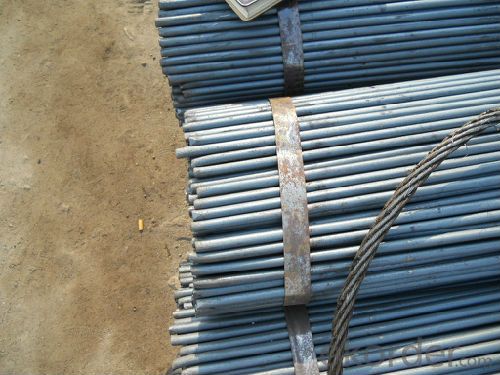
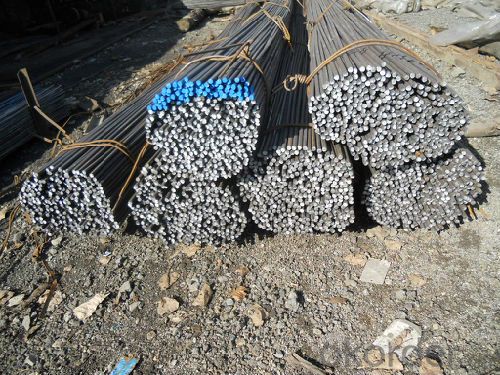
*If you would like to get our price, please inform us the size, standard/material and quantity. Thank you very much for your attention.
- Q: What are the challenges in machining special steel?
- Machining special steel can present several challenges due to its unique properties. One of the main challenges is its high hardness, which requires specialized cutting tools and techniques to effectively shape the steel. Another challenge is the tendency of special steel to work harden, making it more difficult to machine as the process progresses. Additionally, special steel often contains alloying elements that can cause increased tool wear and heat generation during machining, necessitating careful selection of cutting parameters to maintain tool life and prevent thermal damage. Finally, the inherent toughness of special steel can also pose challenges in terms of chip formation and control, as well as potential tool breakage. Overall, machining special steel demands expertise, precision, and appropriate tooling to overcome these challenges and achieve desired results.
- Q: What are the specific requirements for special steel used in the mining industry?
- Special steel used in the mining industry has specific requirements to ensure its durability, strength, and resistance to harsh conditions. Some of the key requirements for special steel used in the mining industry include: 1. High strength: Special steel used in the mining industry must have high tensile strength to withstand heavy loads and resist deformation under extreme conditions. This enables the steel to endure the pressure, impact, and stress that it may encounter during mining operations. 2. Wear resistance: Mining environments involve abrasive materials, such as rocks and ores, which can cause significant wear on equipment. Special steel used in the mining industry needs to have excellent wear resistance to prevent premature failure and increase the lifespan of mining equipment. 3. Corrosion resistance: Mining operations often take place in highly corrosive environments, such as underground mines or near water bodies. Special steel used in the mining industry should possess high corrosion resistance to withstand exposure to chemicals, moisture, and other corrosive agents. This helps prevent rusting, pitting, and other forms of corrosion that can weaken the steel. 4. Toughness: Mining equipment is subjected to heavy impacts and vibrations, which can lead to fractures if the steel is not tough enough. Special steel used in the mining industry should exhibit excellent toughness, allowing it to absorb energy from impacts and vibrations without fracturing. This ensures the safety and reliability of mining equipment. 5. Heat resistance: Mining operations involve high-temperature environments, such as smelting and refining processes. Special steel used in the mining industry must have good heat resistance to withstand the elevated temperatures without losing its strength or undergoing deformation. 6. Machinability: Special steel used in the mining industry should also have good machinability, allowing it to be easily formed into complex shapes or structures. This facilitates the manufacturing process of mining equipment and components. Overall, the specific requirements for special steel used in the mining industry revolve around strength, wear resistance, corrosion resistance, toughness, heat resistance, and machinability. Meeting these requirements is crucial for ensuring the reliability, durability, and safety of mining equipment in the demanding mining environments.
- Q: How does special steel contribute to the manufacturing of bearings?
- Special steel plays a crucial role in the manufacturing of bearings as it offers enhanced strength, durability, and corrosion resistance. The unique properties of special steel, such as high hardness and wear resistance, allow bearings to withstand heavy loads and operate at high speeds. Additionally, special steel alloys can be tailored to specific application requirements, ensuring optimal performance and longevity of bearings in various industries.
- Q: What are the different types of free-cutting steel?
- There are several different types of free-cutting steel, including leaded steels, sulfurized steels, and phosphorized steels. These types of steels are specifically designed to improve machinability and enhance the cutting performance during manufacturing processes.
- Q: How does special steel contribute to the food processing aftermarket industry?
- The food processing aftermarket industry greatly benefits from the use of special steel, as it offers a multitude of advantages that enhance overall efficiency, safety, and productivity. To begin with, special steel is renowned for its remarkable resistance to corrosion. This is particularly crucial in the food processing industry, where equipment frequently encounters acidic and corrosive substances. By utilizing special steel, machinery remains impervious to rust and contamination. As a result, the hygiene and quality standards of food processing operations are maintained, thereby reducing the risk of foodborne illnesses and contamination. Moreover, special steel exhibits exceptional strength and durability, enabling food processing equipment to withstand the demanding conditions of heavy usage and continuous operations. The robustness of special steel ensures the reliability of equipment, minimizing the likelihood of breakdowns or malfunctions during critical production processes. Consequently, operational efficiency is increased, downtime is reduced, and production output is improved. Furthermore, special steel can be customized to suit specific applications, allowing manufacturers to design and produce equipment that meets the unique requirements of the food processing industry. Special steel alloys can be tailored to possess specific properties, such as heat resistance, wear resistance, or hardness, depending on the specific processing needs. This adaptability guarantees that equipment can handle different types of food products, processing techniques, and operating conditions, resulting in enhanced versatility and adaptability within the food processing aftermarket industry. Additionally, special steel is compatible with various cleaning and sterilization processes, making it ideal for food processing equipment. The material can endure high-temperature cleaning methods, such as steam or chemical cleaning, without deteriorating or compromising its structural integrity. This ease of cleaning and sterilization contributes to maintaining the highest standards of hygiene and sanitation within the food processing industry. In conclusion, special steel's resistance to corrosion, strength, durability, customization options, and compatibility with cleaning processes make it an invaluable material within the food processing aftermarket industry. Its contribution to equipment reliability, hygiene, and productivity ensures that food processing operations can meet the stringent quality and safety standards required in this sector.
- Q: How is special steel used in the telecommunications supply chain?
- Special steel is used in the telecommunications supply chain for a variety of applications. It is commonly used in the manufacturing of telecommunication towers, antennas, and satellite dishes due to its high strength and durability. Special steel is also utilized in the production of transmission lines, cables, and connectors, where its corrosion resistance and electrical conductivity properties are essential. Additionally, special steel is employed in the fabrication of equipment racks, cabinets, and enclosures, providing a sturdy and secure housing for telecommunication devices. Overall, special steel plays a crucial role in ensuring the reliability and performance of telecommunications infrastructure.
- Q: What are the different methods for joining special steel components?
- There are several methods for joining special steel components, each with its own advantages and limitations. Some of the common methods include: 1. Welding: This is one of the most widely used methods for joining steel components. It involves melting the edges of the components and fusing them together. Welding can be done using various techniques such as arc welding, gas welding, or laser welding, depending on the specific requirements of the project. 2. Bolting: Bolting involves using bolts, nuts, and washers to join steel components together. This method is preferred for applications where disassembly or maintenance may be required. It provides a strong and reliable connection but may not be suitable for high-stress applications. 3. Riveting: Riveting involves using metal fasteners called rivets to join steel components together. This method is commonly used in applications where high strength and resistance to vibration are required. Riveting is a permanent joining method that provides a strong and durable connection. 4. Adhesive bonding: Adhesive bonding involves using high-strength adhesives to join steel components together. This method is preferred for applications where aesthetics and weight reduction are important. Adhesive bonding can provide a strong and durable connection, but the surface preparation and adhesive selection are critical for ensuring the bond's strength. 5. Mechanical fastening: Mechanical fastening methods, such as using screws or clips, can also be used to join special steel components. This method is often used for temporary connections or for components that need to be easily assembled and disassembled. Each joining method has its own advantages and considerations, and the choice of method depends on factors such as the specific application, load requirements, lifespan expectations, cost considerations, and the nature of the steel components being joined. It is important to carefully evaluate these factors and consult with experts to determine the most suitable joining method for a given project.
- Q: What are the different coating techniques for special steel?
- There are several coating techniques commonly used for special steel, including electroplating, galvanizing, powder coating, thermal spraying, and chemical vapor deposition. Each technique offers unique advantages and is chosen based on the specific requirements of the steel, such as desired appearance, corrosion resistance, hardness, or wear resistance.
- Q: How does special steel contribute to the construction of infrastructure projects?
- Special steel plays a crucial role in the construction of infrastructure projects by offering enhanced strength, durability, and versatility. This type of steel is specifically designed to meet the unique requirements and challenges posed by infrastructure projects, making it an essential component in their successful completion. One way in which special steel contributes to infrastructure projects is through its superior strength. Infrastructure projects, such as bridges, tunnels, and high-rise buildings, require materials that can withstand heavy loads and harsh environmental conditions. Special steel possesses high tensile and yield strength, allowing it to bear significant loads without deformation or failure. This strength ensures the structural integrity and safety of the infrastructure, offering peace of mind to engineers, architects, and the public. Durability is another crucial aspect that special steel brings to infrastructure projects. These projects are often subjected to various environmental factors, including extreme temperatures, moisture, and corrosive elements. Special steel is designed to resist corrosion, oxidation, and degradation, making it highly durable and capable of withstanding harsh conditions. Its long lifespan reduces maintenance and replacement costs, making it a cost-effective choice for infrastructure projects. Versatility is yet another advantage of special steel in infrastructure construction. It can be customized and fabricated into various shapes and sizes to fit the specific needs of different projects. Whether it is used for beams, columns, or reinforcements, special steel offers flexibility in design and construction. This adaptability enables engineers and architects to create innovative and efficient infrastructure designs, optimizing space and resources. Furthermore, special steel contributes to the sustainability of infrastructure projects. Its recyclability and eco-friendly nature make it an environmentally responsible choice. Steel can be recycled without compromising its properties, reducing the demand for new raw materials and minimizing waste. This sustainable approach aligns with the growing emphasis on environmentally friendly construction practices, making special steel an ideal material for infrastructure projects. In conclusion, special steel significantly contributes to the construction of infrastructure projects through its superior strength, durability, versatility, and sustainability. Its ability to withstand heavy loads, harsh environmental conditions, and provide long-lasting performance ensures the safety and reliability of infrastructure. Moreover, its flexibility in design and construction allows for innovative and efficient project execution. With these advantages, special steel remains an essential component in the development of robust and sustainable infrastructure.
- Q: How does special steel contribute to the manufacturing aftermarket industry?
- The manufacturing aftermarket industry greatly relies on special steel to enhance the performance, durability, and reliability of components and equipment. Special steel is particularly valuable because it can withstand extreme conditions like high temperatures, corrosive environments, and heavy loads. This makes it an ideal choice for producing critical parts in industries such as automotive, aerospace, energy, and machinery. In the manufacturing aftermarket industry, special steel is commonly used to create replacement parts for machinery or equipment that have deteriorated or been damaged over time. By using special steel, these replacement parts can meet the specifications set by the original equipment manufacturer (OEM) in terms of strength and resilience. Moreover, special steel enables the development of innovative designs and the production of lightweight and efficient components. This leads to improved equipment performance, reduced energy consumption, and increased productivity. For instance, in the automotive industry, special steel is used to make lightweight engine components, resulting in better fuel efficiency and lower emissions. Furthermore, the use of special steel in the manufacturing aftermarket industry helps to reduce maintenance and downtime costs. By using high-quality steel, the longevity of replacement parts is increased, reducing the need for frequent repairs or replacements. Consequently, this decreases production downtime and associated expenses while enhancing overall equipment reliability. Additionally, special steel offers a wide range of customization possibilities, allowing manufacturers to tailor the material properties to meet specific requirements. This flexibility enables the development of unique solutions and the production of specialized components that meet the demands of different industries. It also enables manufacturers to address specific challenges related to wear resistance, hardness, or toughness, which are crucial factors in the aftermarket industry. In conclusion, special steel plays a crucial role in the manufacturing aftermarket industry by enhancing the performance, durability, and reliability of replacement parts. Its ability to withstand extreme conditions, enable innovative designs, reduce maintenance costs, and offer customization options make it an indispensable material in the production of components and equipment across various industries.
Send your message to us
High Quality Spring Steel Round Bar 40-50mm
- Loading Port:
- China main port
- Payment Terms:
- TT or LC
- Min Order Qty:
- 100 m.t
- Supply Capability:
- 10000 m.t/month
OKorder Service Pledge
OKorder Financial Service
Similar products
Hot products
Hot Searches
Related keywords
